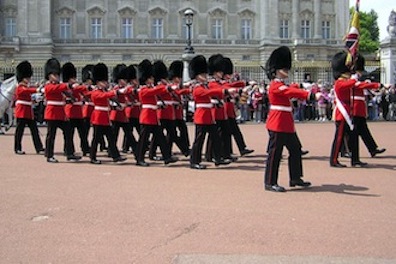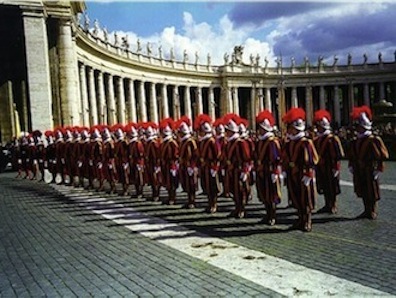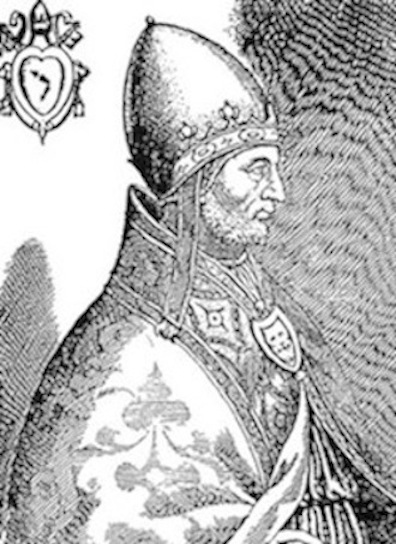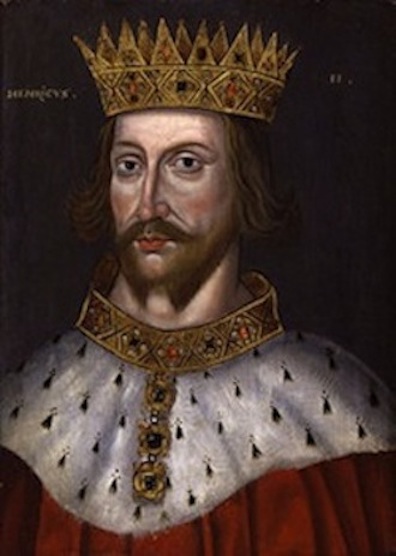Stephen has defined himself in A Portrait of the Artist
as “free of all existing orders,” and he objects entirely as
much to religious orders as to political ones. After his
decision not to become a priest, which is simultaneously a
decision to leave the church, he tells his friend Lynch, “I
will not serve,” echoing the utterance by which Lucifer
rebelled against God: Non serviam. In Circe he
renews his defiance, asserting a Romantic conviction that art can effect a liberation
of the individual mind: "The intellectual
imagination! With me all or not at all. Non serviam!"
Shortly later, tapping his forehead, he thinks, “in
here it is I must kill the priest and the king.”
The individual who accepts submission to the church and the
state can never become his "own
master," as Haines recommends.
Haines understands why an
Irishman might resent the British, but Stephen's
riddling identification of the Catholic Church as "an
Italian" master puzzles him. Anti-colonialism was
linked with anti-clericalism in Joyce’s mind for reasons more
specific than just the abstract similarity of two repressive
regimes. When Stephen rhetorically balances the “imperial
British“ state against the “holy Roman”
church, he is calling attention to a devil’s bargain between
English imperial power and Roman ecclesiastical power in the
second half of the 12th century.
When the western part of the Roman Empire disintegrated in
the 5th century, the western part of the Church played a
crucial role in establishing new forms of social order, laying
some of the foundations for what eventually became modern
European nation-states. Ireland, however, had never been a
part of the Roman Empire, and its church pursued an
independent path, far less concerned with social order and
political hierarchy. The focus of the Irish church was
monasticism. Its abbots wielded far more power and influence
than its bishops, and its monks preserved and advanced
learning at a time when, on the continent, libraries were in
ruins, manuscripts were not being copied, and intellectual
inquiry was largely stagnant. In the 6th and 7th centuries
Irish monks began to export their learning and spirituality to
the impoverished continent. In Proteus, Stephen
thinks about a key early figure of this history, “the fiery Columbanus.”
“Catholic” means “universal,” and Roman means imperial. As
the centuries wore on, Roman clerics expressed increasing
impatience with their Celtic brothers’ independence in matters
of ecclesiastical hierarchy and liturgical rites. In the 12th
century, their impulse to enforce conformity found common
cause with the Norman barons’ hunger to conquer ever more
territories. In 1169 an English cardinal named Nicholas
Breakspear became pontiff; his career had been advanced by the
English king Henry II. As Pope Adrian IV, one of Breakspear’s
first actions was to reward his patron by issuing the infamous
bull that begins with the word Laudabiliter,
condemning the renegade Irish church and awarding temporal sway over all
Ireland to England. This invitation to conquest
triggered the Anglo-Norman invasions of Henry II’s reign,
initiating a long history of English colonialism in
Ireland. And the Norman overlords, remembering their debt
to the pope, reformed the Irish church into a distinctly Roman
Catholic Church forevermore marked by subservience rather
than independence. Many Irish prelates became submissive not
only to Rome but also to Westminster.
In the 1860s the Catholic bishops consistently opposed the fenian movement,
and their rejection of Charles Stewart Parnell, after the
scandal of his adultery broke, turned the tide of public
opinion against that parliamentary evangelist for Home Rule.
Instructed by his patriotic and anti-clerical father, Joyce
was well versed in the craven political
conservatism of the clergy. In 1906 he wrote to his
brother Stanislaus, "I quite see, of course, that the Church
is still, as it was in the time of Adrian IV, the enemy of
Ireland; but, I think, her time is almost up" (Ellmann, 237).
In a long, outrageous, and obscure passage, Oxen of the
Sun plays with the image of an Irish "bull," punning on
Nicholas Breakspear's bull Laudabiliter. Dixon says, "It
is that same bull that was sent to our island by farmer
Nicholas, the bravest cattlebreeder of them all, with an
emerald
ring in his nose.... but before he came over farmer
Nicholas that was a eunuch had him properly gelded by a
college of doctors who were no better off than himself. So be
off now, says he, and do all my cousin german the lord Harry
tells you and take a farmer's blessing, and with that he
slapped his posteriors very soundly." In the sentences that
follow, the bull seems to take on qualities of both the
English monarchy and the Roman clergy. Later, Vincent refers
to the schism between the two in the 16th century. Now Harry
is Henry VIII rather than Henry II, and Nicholas is Pope
Clement VII, who refused to grant Henry a divorce: "There
was bad blood between them at first, says Mr Vincent, and
the lord Harry called farmer Nicholas all the old Nicks in
the world and an old whoremaster that kept seven trulls in
his house and I'll meddle in his matters, says he."
Vincent alludes to English Reformation assaults on the pope as
a Whore of Babylon, drawing on language in the book of
Revelation, and to Old Nick as a popular name for Satan.



